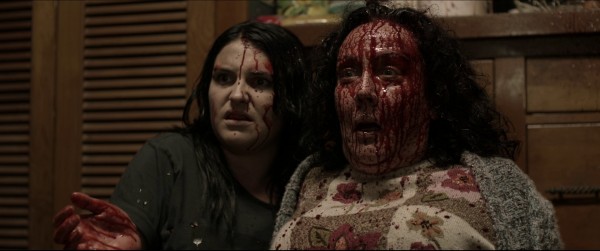There’s such creative assurance in Housebound (the debut film from Gerard Johnstone) that the deft blending of films like The ‘Burbs, Rear Window and—no shit—To Kill A Mockingbird never creates a sense of narrative whiplash. One idea flows into the next, creating a cohesive little world that feels comforting in its familiarity, but unmistakably new. It’s the best case scenario for our nostalgia-soaked pop culture landscape. It’s a mosaic of creepy stories from the last few decades. It’s a spider web.
Our story centers around Kylie (Morgana O’Reilly). She fucks up the attempted theft of an ATM and gets sentenced to eight months of house arrest with her mother Miriam (Rima Te Wiata), a woman who thinks Kylie’s ankle bracelet is a neat piece of technology. Even worse, Miriam is convinced that her house is haunted, claiming to have seen a figure in a white sheet roaming around. Kylie isn’t buying it, of course, until she starts hearing strange noises in the middle of the night and gets “attacked” by a talking teddy bear.
Let’s stop there. There’s obviously more to the story, but I’ve given away more than you might realize. The script is as tightly constructed as anything Bob Gale (Back to the Future) ever put together; and like Gale, there’s a lot of set-up invisibly embedded in the first half of the story that gets paid off beautifully by the end. Even the trope of a ghost in a white bed sheet—the easiest image for Kylie and the audience to brush off as Miriam’s naiveté in action—is not what it appears to be. The talking teddy bear, a roaming cell phone, murmurs in the middle of the night…it all points to a haunting, but it’s in service of a different game that Johnstone is playing. Suffice it to say, the film will play quite differently on a second viewing.
Of course, none of this works if the movie isn’t worth watching the first time around. Luckily, Johnstone’s filmmaking chops are impressively polished for a first-timer. He clearly knew what he wanted to make and had the good sense to stage his suspense scenes with more than just clever camera angles. I’d love to see the shooting script, because everything is so tightly constructed, even the specific timing of the sound design. That stuff doesn’t just happen and I wonder how much of the movie Johnstone had in his head going in and how much was put together in editing. At any rate, it’s filmmaking from another era. It’s pointed and specific in ways that we just don’t see often enough any more.
It’s also nice to see a female character act like such a piece of shit. Kylie sulks through the first half of the story, day-drinking and sleeping in until noon because…fuck it. She’s in as much trouble as she can possibly be in, so any social pretenses just drop. O’Reilly does a lot of her best work as Kylie when she’s playing silent disgust—as if everyone and everything around her were smeared in shit—her lips curled back in a defensive sneer. When she engages with the mystery of the house, it comes from a similar, believable place. What else does she have to do? But as the film goes on and she becomes a more active participant, O’Reilly sells the change without getting too schmaltzy. There’s a great scene where she uses Miriam’s inability to shut the fuck up as a decoy, and it’s an interesting turning point. She may not like her mother any more than she used to, but she’s spinning negative traits into positives. It’s as close to embracing her mother for who she is as Kylie’s going to get and it’s nicely played.
Overall, the film doesn’t ask the characters to betray who they are for the sake of some third-act twist. It’s also what makes the calculated nature of the story so impressive, because the clockwork never grinds gears and there’s no cheating. Kylie makes friends with Amos, the tech who monitors her ankle bracelet, and they have an incredible, no bullshit moment where he slaps her when she tries to violate her parole by leaving town. It’s a desperate thing he does to stop Kylie and he does it because he—like so many characters in this film—doesn’t know how to tell her how much he really cares. There’s a similar moment where Kylie’s stepfather asks for her help with something in the basement and he apologizes for being too quiet. He explains that he’s often mistaken for being rude or uncaring because of his silence and he doesn’t want Kylie to think he doesn’t like her because of it. It’s incredibly sweet and gets to the real heart of the movie: everyone’s a little misunderstood.
Like Edgar Wright, Johnstone has a solid grasp on both his genre and the people populating the world he’s created. Plenty of filmmakers pay lip service to their love of horror by quoting it explicitly (hell, even Wright is sometimes guilty of that), but far fewer hit on something genuine. Simply put, this is a real movie, the kind someone else is going to try to emulate some day. Hopefully that film will be as good as Housebound.
